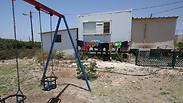
The blatantly illegal order of the 'regulation bill'
Op-ed: A 'blatantly illegal order' does not apply only to soldiers in the military context, but also to any person given an order from his superiors that 'pierces the eye and revolts the heart.' Therefore, if the law to legalize Amona and other such outposts passes, those entrusted with implementing it must disobey the order.
Last week was the 60th anniversary of the Kafr Qasim massacre.
The anniversary was marked with a rally at the village and extensive articles in newspapers. But the writers of these articles rarely quoted from the verdict that found the murderers guilty. This is a verdict of the utmost importance, in which the lead judge, Benjamin Halevy, coined the phrase "blatantly illegal order," and explained how to determine whether blatant illegality "waves like a black flag over the given order."
"It is not a formal illegality, obscure or partially obscure, not illegality that can be discerned only by legal scholars, that is important here," Halevy wrote, "but rather, the clear and obvious violation of law, illegality appearing on the face of the order itself, clear criminal nature appearing in the order itself or the acts being ordered. Illegality that pierces the eye and revolts the heart, if the eye is not blind and the heart is not impenetrable or corrupt."
It appears the judge had a difficulty in phrasing. He needed several consecutive sentences, with almost identical meaning, to convey his meaning, concluding with a poetic sentence to describe what a person with normative ethics would feel when ordered to carry out a terrible injustice.
Judge Halevy's definition led to the conviction of Shin Bet operative Ehud Yatom and his men, who smashed the skulls of the terrorists in the Bus 300 affair, and of a soldier who fired a rubber bullet at a bound and blindfolded Palestinian during rioting in Naalin. In both cases, the defendants were expected to refuse the orders—or insinuations—of their commanders.
The word "order" commonly refers to an instruction given in the military context—but the Shin Bet's operatives are not soldiers. From this, we can conclude that a civilian working in a hierarchical organization—which is not a military—will also face punishment if he doesn't notice the "black flag" waving over the order and if he doesn't disobey his superiors.
We can also conclude that a blatantly illegal order is not just one that results in the loss of lives, and that other orders that "pierce the eye and revolt the heart" can also fall under that definition. Meaning, any person under the authority of another can face punishment if he doesn't refuse a blatantly illegal order given to him.
But there's a big difference between a soldier and a civilian. It's hard to refuse an order by a commander in the military, especially in the midst of an operation that doesn't allow a lot of time for deliberations. The heat of battle, the fear of the commander, and the mood among the comrades in arms could dim the sense of morality. It's easier to disobey a superior in the context of civilian bureaucracy. That is why I believe white collar offenders who fail to notice the "black flag" should face harsher punishments than soldiers who fail to identify a blatantly illegal order.
I think about Sgt. Elor Azaria compared to the ministers and MKs who initiated the so-called "regulation bill," that would legalize Amona and other such outposts in the West Bank. The latter are immune from prosecution, their livelihood is guaranteed, and they are not expected to meet work quotas. The gravest danger they face is losing their spot in the next elections. Inside their air-conditioned offices, they have plenty of time to ponder moral decisions, and if they can't notice the "black flag," then their heart is impenetrable and corrupt.
And, indeed, they initiate an action that would result in the seizing of property of people who are under occupation and giving it to the citizens of the occupying nation in contradiction with the Law of Nations, our own Basic Laws, and the moral instincts of any normative individual.
The attorney general noticed this and warned the government that the High Court of Justice would reject the law due to the aforementioned reasons. The justice minister was quick to respond by saying the attorney general has no veto power, he's merely an advisor.
If his legal advice is ignored, and the law passes in one cunning way or another, every person whose work involves the implementation of this law must disobey the orders he receives—whatever the cost the regime exacts of him. He would have to insist that he could not obey a blatantly illegal order.


















